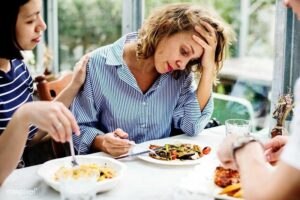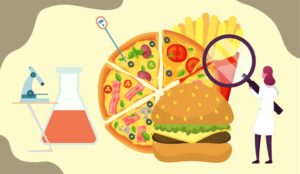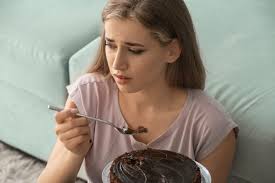Do you feel anxious after eating? If so, you’re not alone. Many people experience anxiety after eating, and for a variety of different reasons. In this blog post, we will discuss what is anxiety after eating, why it happens, and the major causes of it. We will also provide some tips for managing anxiety after eating.
Contents
What Is Anxiety After Eating?
 Anxiety is basically a feeling of worry, nervousness, or unease. When you have anxiety after eating, it may have to do with a specific food or meal that you just ate, or it may be more general anxiety that you feel all the time. Anxiety after eating can also be caused by other factors in your life, such as stress.
Anxiety is basically a feeling of worry, nervousness, or unease. When you have anxiety after eating, it may have to do with a specific food or meal that you just ate, or it may be more general anxiety that you feel all the time. Anxiety after eating can also be caused by other factors in your life, such as stress.
Moreover, this condition is not the same as an eating disorder, although the two can be related. With anxiety after eating, you’re not necessarily worried about your weight or body image. Instead, you may be anxious about getting sick, having a food allergy, or choking on your food.
This anxiety can be a short-term thing that goes away on its own, or it can be a long-term problem that requires treatment. You should be aware of the different symptoms of anxiety after eating so that you can better identify it and get the help that you need.
Symptoms of Anxiety After Eating
There are a few different symptoms that may be associated with anxiety after eating. Some common signs and symptoms are as follows:
- Nausea
- Stomach pain or cramping
- Diarrhea
- Heartburn
- Headache
- Dizziness
- Uncomfortable fullness
These symptoms can range in severity from person to person. For some, they may only experience a few of these symptoms while others may experience all of them. In fact, it is believed that anxiety after eating is one of the most common causes of stomach pain.
Causes of Anxiety After Eating
There are a few different things that can cause anxiety after eating. Some of the more common causes are as follows:
Overeating
This is one of the most common causes of anxiety after eating. When you overeat, your stomach feels full and bloated. This can lead to feelings of anxiety and uneasiness. Moreover, overeating can also cause heartburn and indigestion, which can further contribute to anxiety.
It is also known as “food anxiety”. It is a type of anxiety that is caused by the fear of not being able to eat or not having enough food. This can be a result of a number of different things, such as an eating disorder, poverty, or even just stress.
Low blood sugar
Low blood sugar is also known as hypoglycemia, and it occurs when your blood sugar drops below 70 mg/dl. It can be caused by skipping meals or not eating enough carbohydrates. When you eat, your body breaks down the food into glucose and other nutrients, which enter your bloodstream. Your pancreas then releases insulin, which helps move glucose from your blood into your cells for energy.
In people with reactive hypoglycemia, the body produces too much insulin, causing blood sugar to drop too low. This can happen after eating a high-carbohydrate meal or if you have diabetes and are taking insulin or other diabetes medications. With this, some physical symptoms are:
- sweating
- heart palpitations
- feeling shaky
- dizziness or lightheadedness
- headache
- anxiety or feeling jittery
Food triggers
 Anxiety after eating can be caused by different things for different people. It might be a certain food or drink that you had, or it could be related to how you’re feeling in general. In fact, foods high in sugar or caffeine can actually trigger anxiety symptoms.
Anxiety after eating can be caused by different things for different people. It might be a certain food or drink that you had, or it could be related to how you’re feeling in general. In fact, foods high in sugar or caffeine can actually trigger anxiety symptoms.
Some of the triggers can be:
- cheese
- cured meats
- processed foods
- sugars
- artificial sweeteners
- trans fats
- refined carbs
- alcohol and caffeine
These foods can cause anxiety because they can promote inflammation in the body. Inflammation is a natural response to injury or infection, but chronic inflammation can lead to health problems.
Allergies and intolerances
This can be a common trigger for anxiety after eating. If you have an allergy or intolerance to a certain food, your body can react in ways that make you feel anxious. This can include:
- feeling nauseous
- having a headache
- feeling dizzy and lightheaded
- difficulty breathing
- rapid heartbeat
These are some symptoms that can be associated with anxiety after eating. Allergies are often the cause of these symptoms, but they can also be caused by other factors such as intolerance to certain foods. If you think that allergies may be the cause of your anxiety after eating, it is important to see a doctor or allergist to get tested.
Lapsing back into old patterns
People are creatures of habit. Once we establish a routine, it can be hard to break out of it. This is especially true when it comes to our eating habits. In fact, research has shown that it takes an average of 66 days to form a new habit. So, if you’re trying to break the anxious eating cycle, it’s going to take some time and effort.
Moreover, eating habits are often intertwined with our emotions. When we’re feeling stressed, anxious, or down, we may turn to food for comfort. This can be a difficult pattern to break because it’s not just about the food itself, but also the emotional connection we have to it.
Bad experiences with food
When it comes to anxiety after eating, one of the most common triggers is bad experiences with food. This could be anything from choking on a piece of food as a child to having an unpleasant experience at a restaurant. These types of experiences can leave you feeling anxious about eating in general, or about certain foods specifically.
Also, there could be a more general fear of vomiting (emetophobia) that leads to anxiety about eating. This is often a result of a previous experience with vomiting or seeing someone else vomit. Additionally, some people have anxiety around mealtimes because they associate it with being overweight or having body image issues.
So, overall these are some of the most common triggers for anxiety after eating. It is necessary to work on identifying your triggers in order to start managing your anxiety.
Negative Impacts Of Anxiety After Eating
 There are a few potential negative impacts of anxiety after eating. Some of these are as follows:
There are a few potential negative impacts of anxiety after eating. Some of these are as follows:
Indigestion
This is one of the most common effects of anxiety after eating. It can cause stomach pain, bloating, and nausea. Anxiety can also worsen existing digestive disorders such as irritable bowel syndrome (IBS). Also, indigestion is a common trigger for heartburn and acid reflux.
Weight gain
Anxiety after eating can also lead to weight gain. This is because anxiety can cause you to eat more than you need to. It can also lead to unhealthy eating habits, such as binge eating or emotional eating. And, in this way, anxiety can contribute to obesity.
Poor nutrition
Anxiety after eating can also lead to poor nutrition. This is because anxiety can cause you to avoid certain foods or eat too much of others. For example, you may avoid fruits and vegetables because you are worried about them making your anxiety worse. Or, you may eat too much junk food because it is easy and comforting.
Loss of appetite
Anxiety can also cause a loss of appetite. This can lead to weight loss, which can be unhealthy if it is not done in a healthy way. Anxiety can also cause you to miss out on important nutrients that your body needs. Appetite is basically defined as how much food you feel like eating. It is normal to have days where you don’t feel like eating much, but if this is a regular thing, it could be a sign of an underlying problem such as anxiety.
Difficulty concentration
When you are dealing with anxiety after eating, it can be difficult to focus on anything else. You may find yourself feeling restless and unable to concentrate on anything for long periods of time. This can make it hard to work or study effectively, and can also impact your social life. Because you will feel distracted and more focused on your anxiety, this way your concentration on other things will lose.
These are some negative impacts that anxiety after eating can have on your life. It is important to find ways to deal with this problem so that it does not take over your life. Also, it is believed that anxiety after eating is caused by a combination of factors, so it is important to address all of the possible causes in order to treat it better way.
How To Deal With Anxiety After Eating?
 Although it is not a common condition, some people experience anxiety after eating. This can be caused by several factors, including indigestion, food intolerance, or even stress. If you are one of those who suffer from this condition, here are some tips on how to deal with it.
Although it is not a common condition, some people experience anxiety after eating. This can be caused by several factors, including indigestion, food intolerance, or even stress. If you are one of those who suffer from this condition, here are some tips on how to deal with it.
Identify the triggers
First of all, you need to identify what triggers your anxiety after eating. Ask yourself questions like:
- Is it certain foods or drinks?
- Or is it only when you eat in public?
Once you know the triggers, you can start to avoid them. Also, try to keep a food diary to help you identify patterns. It is believed that certain foods, like caffeine or sugar, can trigger anxiety.
Avoid eating on the go
If you often experience anxiety after eating, it is important to take your time when eating. Try to sit down and savor your food. Avoid eating on the go as this can make your symptoms worse. Moreover, eating too fast can also lead to indigestion, which can trigger anxiety.
Choose healthy foods
You should also pay attention to what you eat. Eating a healthy diet is important for overall health, but it can also help reduce anxiety. Choose foods that are high in fiber and protein and low in sugar. Also, make sure to drink plenty of water. More often than not, anxiety is caused by dehydration. It is essential in many ways, but water can also help you feel calmer.
Eat mindfully
When you eat mindfully, you are more aware of what you are putting into your body. This can help you avoid trigger foods and also help you control portion sizes. To eat mindfully, try to focus on the taste, texture, and smell of your food. This is often easier said than done, but it is worth it if it helps reduce your anxiety.
Chew slowly and thoroughly
Another way to improve digestion and reduce anxiety is to chew your food slowly and thoroughly. This gives your body time to break down the food properly, which can prevent indigestion. It also helps you eat less because you will feel fuller faster. Although this is a small change, it can make a big difference.
Get regular exercise
Last but not least, regular exercise is also important. Exercise can help reduce stress and improve your overall health. It is also a great way to get rid of excess energy, which can be helpful if you are feeling anxious. Just make sure to listen to your body and not overdo it. Also, staying active is a great way to prevent anxiety in the first place. Though it may not be the first thing you want to do when you’re feeling anxious, exercise can be very beneficial.
Try relaxation techniques
 If you find yourself feeling anxious after eating, try some relaxation techniques. Deep breathing and progressive muscle relaxation are two simple but effective ways to reduce anxiety. You can also try yoga or meditation. These activities can help you focus on the present moment and calm your mind. There are many types of meditation that you can try, so find one that works best for you.
If you find yourself feeling anxious after eating, try some relaxation techniques. Deep breathing and progressive muscle relaxation are two simple but effective ways to reduce anxiety. You can also try yoga or meditation. These activities can help you focus on the present moment and calm your mind. There are many types of meditation that you can try, so find one that works best for you.
Talk to a therapist
Anxiety after eating is believed to be caused by several factors. If you find that you are struggling to cope with your anxiety, it is important to talk to a therapist. They can help you identify the root cause of your anxiety and develop a treatment plan. Therapists can also teach you some helpful coping mechanisms. Also, therapies are believed to work in a way that helps you change your thinking patterns. This can be very beneficial in the long run.
So, these are some tips on how to deal with anxiety after eating. If you find that your anxiety is impacting your quality of life, it is important to seek professional help. Otherwise, it can be helpful to try some of the tips above. Overall, getting help and identifying your triggers is the best way to deal with anxiety after eating.
Conclusion
Conclusively, anxiety after eating is caused by a variety of factors. These can include nutrient deficiencies, food sensitivities, and even psychological factors. However, there are ways to deal with anxiety after eating. Moreover, it is necessary to seek professional help if the anxiety is severe and impacting one’s quality of life.
For more information, please contact MantraCare. Anxiety is a common mental health condition characterized by persistent feelings of worry, fear, and apprehension. If you have any queries regarding Online Anxiety Counseling experienced therapists at MantraCare can help: Book a trial Anxiety therapy session


